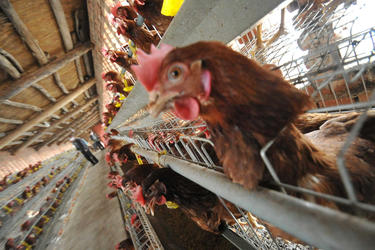Health officials concerned that deadly bird flu could soon pass easily between humans
ChinaFotoPress/Getty Images


A free daily email with the biggest news stories of the day – and the best features from TheWeek.com
You are now subscribed
Your newsletter sign-up was successful
All it would take is five gene mutations of the H5N1 avian influenza virus to potentially create havoc on a global scale. Dutch researchers are reporting that if those mutations happen, the virus would become transmissible via coughing or sneezing, just like regular flu viruses. Currently, most cases of H5N1 arise after a person has had contact with sick or dead infected poultry.
To give an idea of how deadly the avian flu virus is, scientists at one point stopped conducting research on H5N1 over concerns that in the wrong hands it could be used as a biological weapon by terrorists. Of the 650 people infected since H5N1 was first identified in Hong Kong 17 years ago, 60 percent died because of the disease.
Health officials have feared that H5N1 would evolve, but they are not sure if the virus is likely to mutate outside of a laboratory. "The biggest unknown is whether the viruses are likely to gain the critical mutations naturally," says Richard Webby, a virologist at St. Jude Children's Research Hospital in Memphis. "If they can appear readily, then it is very worrisome. If not, then there's still a major hurdle that these viruses have to get over to become human-transmissible."
The Week
Escape your echo chamber. Get the facts behind the news, plus analysis from multiple perspectives.

Sign up for The Week's Free Newsletters
From our morning news briefing to a weekly Good News Newsletter, get the best of The Week delivered directly to your inbox.
From our morning news briefing to a weekly Good News Newsletter, get the best of The Week delivered directly to your inbox.
During the study, which was published Thursday in the journal Cell, researchers used ferrets as stand-ins for humans. They sprayed an altered version of the H5N1 virus into a ferret's nose, then put it in a special cage with a ferret who had not been exposed. The cage was constructed to allow shared airflow without direct contact, and when the healthy ferret exhibited signs of the flu (loss of appetite and energy, ruffled fur) they knew the virus had spread through the air. Read more about the study and its findings at the Los Angeles Times.
A free daily email with the biggest news stories of the day – and the best features from TheWeek.com
Catherine Garcia has worked as a senior writer at The Week since 2014. Her writing and reporting have appeared in Entertainment Weekly, The New York Times, Wirecutter, NBC News and "The Book of Jezebel," among others. She's a graduate of the University of Redlands and the Columbia University Graduate School of Journalism.
-
 The Olympic timekeepers keeping the Games on track
The Olympic timekeepers keeping the Games on trackUnder the Radar Swiss watchmaking giant Omega has been at the finish line of every Olympic Games for nearly 100 years
-
 Will increasing tensions with Iran boil over into war?
Will increasing tensions with Iran boil over into war?Today’s Big Question President Donald Trump has recently been threatening the country
-
 Corruption: The spy sheikh and the president
Corruption: The spy sheikh and the presidentFeature Trump is at the center of another scandal
-
 Trump HHS slashes advised child vaccinations
Trump HHS slashes advised child vaccinationsSpeed Read In a widely condemned move, the CDC will now recommend that children get vaccinated against 11 communicable diseases, not 17
-
 FDA OKs generic abortion pill, riling the right
FDA OKs generic abortion pill, riling the rightSpeed Read The drug in question is a generic version of mifepristone, used to carry out two-thirds of US abortions
-
 RFK Jr. vaccine panel advises restricting MMRV shot
RFK Jr. vaccine panel advises restricting MMRV shotSpeed Read The committee voted to restrict access to a childhood vaccine against chickenpox
-
 Texas declares end to measles outbreak
Texas declares end to measles outbreakSpeed Read The vaccine-preventable disease is still spreading in neighboring states, Mexico and Canada
-
 RFK Jr. shuts down mRNA vaccine funding at agency
RFK Jr. shuts down mRNA vaccine funding at agencySpeed Read The decision canceled or modified 22 projects, primarily for work on vaccines and therapeutics for respiratory viruses
-
 Measles cases surge to 33-year high
Measles cases surge to 33-year highSpeed Read The infection was declared eliminated from the US in 2000 but has seen a resurgence amid vaccine hesitancy
-
 Kennedy's vaccine panel signals skepticism, change
Kennedy's vaccine panel signals skepticism, changeSpeed Read RFK Jr.'s new vaccine advisory board intends to make changes to the decades-old US immunization system
-
 Kennedy ousts entire CDC vaccine advisory panel
Kennedy ousts entire CDC vaccine advisory panelspeed read Health Secretary RFK Jr. is a longtime anti-vaccine activist who has criticized the panel of experts
